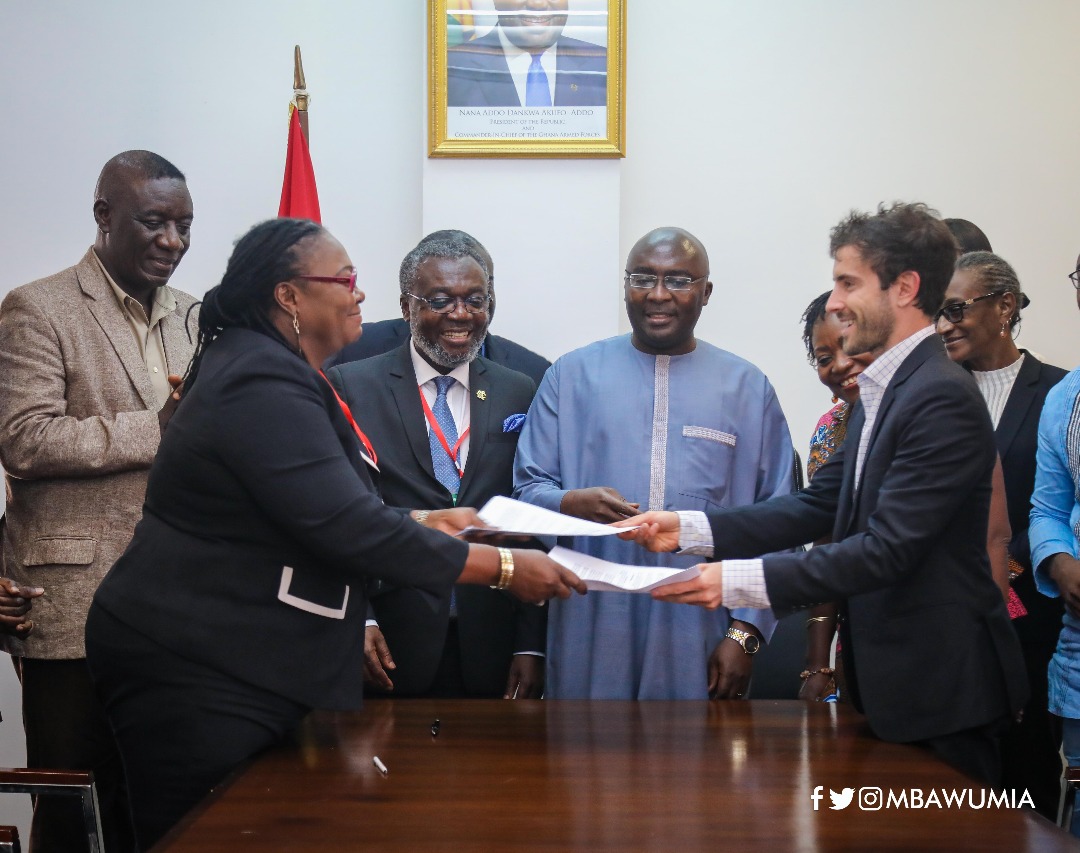
The Ministry of Health has signed a Letter of Intent with the developer and operator of Unmanned Aircraft Systems, popularly known as drones, to offer a drone-enabled supply chain solution in Ghana that will ensure secure, reliable and timely deliveries of essential health care products to hospitals and other health facilities.
The Service, which will be designed, installed and operated by USA-based Zipline International Inc. in partnership with the Ghana Health Service, will leverage technology to improve the supply chain of critical medical supplies, reduce waste and save lives.
A Deputy Minister of Health, Tina Mensah, signed on behalf of Ghana while Keller Rinaudo, CEO of Zipline, signed for his company in Accra on Monday 23rd April, 2018, in the presence of Vice President Dr Mahamudu Bawumia, who has championed the governmental effort to ensure the use of innovation and technology in public service delivery.
Zipline was one of the many companies with cutting-edge technology who met and held discussions with the Vice President and the founders and leaders of a number of Ghanaian ICT firms a few weeks ago during Dr Bawumia’s working visit to Silicon Valley, California, USA.
A number of companies based in the ICT hub of Silicon Valley have also indicated their readiness to explore partnership opportunities with their Ghanaian counterparts after the trip to design and implement Ghanaian solutions for Ghanaian challenges.
Speaking earlier in the day at the 2018 edition of the Ministry of Health and Partners Health Summit, H.E. Dr Mahamudu Bawumia had indicated that government was exploring innovative ways, including the use of drone technology, to make universal health care available to every Ghanaian in a timely manner irrespective of location.
According to officials, Ghana will become the first country in West Africa, and the largest in the world, to use such a delivery system when it is fully deployed.
The system can also be employed to deliver other items such as urgent letters, examination papers and election materials such as ballot papers, officials maintain.
Addressing the media after the brief signing ceremony, which was witnessed by officials from the National Blood Bank, Ghana Post and Ghana Civil Aviation Authority, Tina Mensah extolled the virtues of such a system for efficient health care delivery.
“Very soon we will be seeing some drones flying to hitherto hard to reach areas of this country and thereby we will be saving lives. It will have so many uses. For example, when there is an accident somewhere, instead of transporting essential healthcare products by vehicle which would take a lot more time, the drones can just deliver within the shortest possible time, so lives could be saved.”
The Director General of the Ghana Health Service (GHS), Dr. Anthony Nsiah Asare, recounted how this technology has helped in the healthcare delivery systems in Rwanda to the admiration of the global medical field and was optimistic its introduction in Ghana will improve the performance of the GHS.
He called for speedy implementation of the technology for efficient healthcare delivery.
Meanwhile, the Ghana Civil Aviation Authority has pledged to create an air corridor for drones to prevent collisions with aeroplanes and other larger aircraft.
Source: Ghana/Starrfmonline.com/103.5FM




